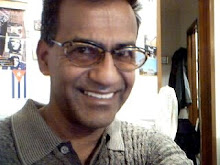It was so touching for me to see this patient
A 35 year old mother of four, the oldest being 15 and the youngest being 5, living with her brother and sister, separated from her spouse.
Two months ago she had come for a physical examination, and that time was found to have very high blood sugars. On 30th September 2009, A1C was found to be 12.7.
She was begun on 70/30 insulin twice daily.
More importantly the Diabetes team had entered into discussion with her regarding her eating and other life habits.
The two immediate actions she took were stopping completely the drinking of Pop and secondly toe decrease frying of her food.
I saw her today November 19, 2009 at the clinic.
Her fasting Blood sugar was 120 and HgA1c was 9.2 %. A reduction of average blood sugar of more than 100 mg/dl.
What does take someone like her to do this, in this short period of time, in seven weeks time. ?
Let us dissect it using the Indian Paradigm.. Medical/Social/Spiritual resolution of this problem.
Indians who become Diabetic (almost always Type 2) at a younger age, I strongly believe, has a defect in the metabolism whereas those persons, Indians and non Indians alike who become diabetic (type 2) at a later age, which is much more physiologic. After taking into consideration of any precipitating factor such as excessive use of Alcohol, the treatment should be directed towards the aetiology in this group of people.
The cultural relevance here is that, most of our patients who become diabetic at this age, are overweight with truncal obesity, and could trace their glucose dysfunction to many years, with Gestational Diabetes or Acanthosis Nigricans. As such they have built a history of Insulin Resistance.
Clinical experience show that they respond much less to oral agents than to Insulin. No need for fancy insulin analogues, but like in this lady 70/30 for the ease of use, and then the providers can further tailor the dosge or medication.
She was not given the choice and insisted on going on Insulin as the first method of treatment.
The social aspect: she is unemployed, has four children, aged 15 to five years of age, lives with her brother and sister. Subsists on Unemployment compensation and Food Stamp Programme. He husband had left her and provides no financial support. She recognized the need to be healthy so that she can look after her children, she listened to the advice of the Diabetes Team and made two changes: to avoid frying of the food and secondly not to drink Pop.
The diabetes team patiently and sympathetically listens to her regarding her problems, whether or not they are medical or medically related to her condition. Encourages her efforts through her difficult financial situation. This is the time I feel immensely grateful to the Indian Health Service where a patient with Diabetes can obtain, without any cost, visits to the Health Care Provider, Optometrist, Podiatrist, Pharmacist among others.
And patients like her, pays us the dividend, by looking after themselves.
One important way of thinking among the Indians that is different is: they respond to shown care and not being told that others care for them. One Meskwakia patient told me, if you don’t care for me, why should I care for myself? An entirely different world view…
Our collective care of this patient has paid off, her feeling better and being better is also good for her tribe and her family and her people.
I would like to talk to her more, and learn about her circumstances and how she is achieving life style changes and habits.. and the motivation behind them.
